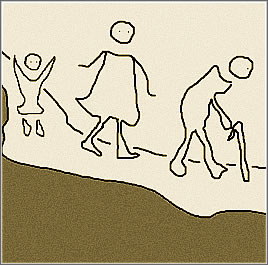»A society that cannot bear old age will be destroyed by its own selfishness.« Willy Brandt
 How old are you?
How old are you?
When I was six, I thought I was old – I was, after all, about to start school. When I was eighteen, I did not feel like an adult. And now? I feel young, middle-aged or old, depending on who is looking at me or talking to me. I might feel fresh or stale, experienced or inexperienced. Why is the dermatologist trying to sell me anti-wrinkle cream? I thought millennials were forever young?
Anyone who has been born has legal capacity. Be it school attendance, criminal accountability or the vote: age limits and thresholds mark particular stages in our biographies. Time, beginning, end, development, change. Our own age is just a simple number, but it brings with it a world of meanings. It is a social construct: there is a calendar age and a biological age. These denotations follow no natural necessity; they are social agreements that we have grown up with and which we often accept as given. We allow such definitions to shape our individual identity. Employee age also plays an important role for companies and in diversity management: consider child labour laws, childcare provision in family-friendly companies or retirement schemes. It is also relevant with regard to capacities, staffing, team composition, and every day in the way individual employees act around each other.
»Age« can mean any age. Each age has its own ascriptions. The terms »young« and »old« usually hide assumptions and stereotypes: for example, that young people have less experience or that older people are no longer flexible. As organizational consultants, we have to ask which kind of ascriptions, rules and norms are defining and shape an organizational culture. What does that mean for the working climate and the attainment and work processes? For companies with an international remit, we also have to ask how definitions of age and the corresponding expectations differ depending on and shaped by the culture and laws of a country.
»Nothing displays a person’s age as much as when they denigrate the young generation.« Hermann Hesse
In 2020, half the population in Germany will be over 50 years old. All generations need to consciously note this fact now, here and today and put it on their agendas. This is about ageing processes as well as the integration of different generations. Germany is ageing, but international migration combined with a shortage of specialists is bringing young generations into companies. This is not a hypothetical situation: it is happening right now. A holistic diversity management approach should therefore realistically address all generations and age groups. The entire workforce should be made aware of the fact that all employees can learn from each other. That is easier said than done.
It does not matter which category the diversity management is focused on: in company cultures where hierarchical career ladders, seniority principles and authority are part of the norm, the creation of a new awareness will require enormous changes in personal attitudes and daily interactions as well as in organizational structures. This concerns people of all ages.
In what way is age related to experience and ability? Here, I support a deconstructivist approach. Trust the (given) age and individuality of a person. Mentality and performance should be more decisive than an image I might have in my head of you or myself. PS: I will not use anti-wrinkle cream.
Hanna Göhler
